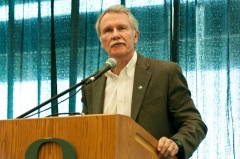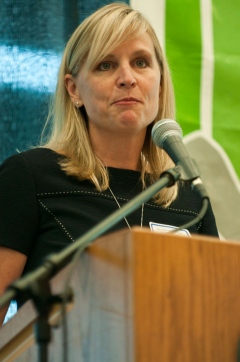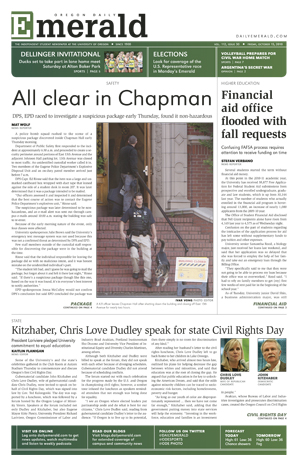Some of the University's and the state's celebrities gathered in the Club Room at Autzen Stadium Thursday to commemorate and discuss Oregon's first Civil Rights Day.
Gubernatorial candidate John Kitzhaber and Chris Love Dudley, wife of gubernatorial candidate Chris Dudley, were invited to speak on behalf of Civil Rights Day, which was signed into law by Gov. Ted Kulongoski. The day was supported by a luncheon, which was followed by a forum hosted by the Oregon League of Minority Voters. Speakers at the forum included not only Dudley and Kitzhaber, but also Eugene Mayor Kitty Piercy, University President Richard Lariviere, Oregon Commissioner of Labor and Industry Brad Avakian, Portland businessman Sho Dozono and University Vice President of Institutional Equity and Diversity Charles Martinez, among others.
Although both Kitzhaber and Dudley were billed to speak at the forum, they did not speak with each other because of diverging schedules. Gubernatorial candidate Dudley did not attend because of scheduling conflicts.
The forum started out with much celebration for the progress made by the U.S. and Oregon in championing civil rights; however, a somber tone infused the luncheon as speakers reminded attendees that not enough was being done for equality.
"I see an Oregon where elected leaders put partisanship aside and do what is best for our citizens," Chris Love Dudley said, reading from gubernatorial candidate Dudley's letter to the audience. "If Oregon is to live up to its potential, then there simply is no room for discrimination of any kind."
After reading her husband's letter to the civil rights luncheon, Chris Love Dudley left to go back home to her children in Lake Oswego.
Kitzhaber, who arrived almost two hours late, outlined his plans for helping decrease the gap between whites and minorities, and said that education was at the root of closing the gap. He argued that public education is the key to unlocking the American Dream, and said that the odds against minority children can be traced to socioeconomic risk factors, including homelessness, poverty and hunger.
"As long as our youth of color are disproportionately represented ... then we have not come far enough," Kitzhaber said, adding that the government putting money into state services will help the economy. "Investing in the workforce, education and families is an investment in people."
Avakian, whose Bureau of Labor and Industries investigates and prosecutes discrimination cases, created the Oregon Council on Civil Rights last year, and wants the council to identify how it is possible to enforce civil rights and how to make it possible for people, regardless of gender or race, to get equal pay for equal work. He also identified several hate groups within Oregon's borders, including the Pacifica Forum, which riled students last year to take action against them.
"We must realize for ourselves the good and the ugly before we can evolve," Avakian said. "If you're a white supremacist looking to make your place in our state, the vacancy sign is out."
Lariviere said that although Oregon's history toward civil rights has been murky, the steps that were taken yesterday were important in recognizing how much still needed to be done.
"While Oregon takes pride in its accepting nature, there is still work to be done," Lariviere said. "The University of Oregon takes this promise (of equal education for minorities and whites) very seriously, and I promise you, we will do much more ... to improve the civil rights landscape for every person in this state."
Dozono compared the immediate treatment of Muslim and Arab Americans after 9/11 to the interment of Japanese Americans during World War II, saying that it was important for minorities to look out for one another.
"We can learn from history, but we have to be vigilant," Dozono said. "We have to be looking out for each other so we can enjoy the freedoms our Constitution provides us."
University graduate student Kari Herinckx thinks that University students still need to understand the problems facing minorities.
"The struggle still exists, and with new times comes new leadership, especially for our generation," she said.
Oregon League of Minority Voters Executive Director Promise King said that Oregon's first Civil Rights Day is an important step for Oregon.
"It's critical enough and crucial enough for us to set a day aside," King said. "The issue of liberty and the sanctity of human dignity is something that cannot be taken for granted as a state. Now is the time for us to come together and make this vision happen."
news@dailyemerald.com










1 comments
'Riling' people is not a crime under US law. 'Taking action' is. Has Oregon has seceded from the USA?
"We must realize for ourselves the good and the ugly before we can evolve", says Avakian. A strangely mixture of morality and Darwinism.
If the Pacifica Forum has achieved anything, it is the exposure of most of the political spectrum, from the anarchists to the mayor of Eugene to the governor of the state, as opponents of freedom. For what end, I don't know.